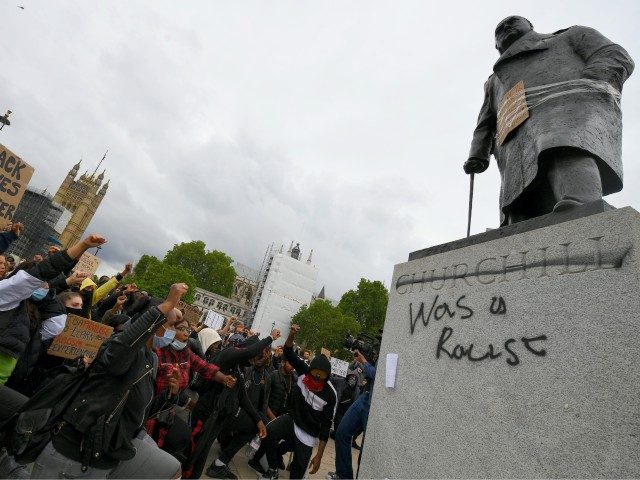Black Lives Matter UK activists have been revealed as out of touch with the British people after a Policy Exchange poll revealed that the public is concerned at the prospect of far-left activism re-writing British history.
The tearing down of the statue of Edward Colston — the Bristolian tradesman, MP, and philanthropist who had ties to the slave trade — by far-left Black Lives Matter activists sparked a wave of calls to remove memorials of other historical figures who contributed to the building of Britain, including war-time prime minister Sir Winston Churchill.
In research conducted by the centre-right Policy Exchange and published on Sunday, pollsters found that the acts are largely out of step with the view of Britons.
More than two-thirds, 69 per cent, said that British history was something to be proud of, compared to just 17 per cent who said they were ashamed of it.
Almost as many, 65 per cent, said that it was “unfair to make judgments about people in the past based on today’s values” and agreed that “statues of people who were once celebrated should be allowed to stand”.
Additionally, more than three-quarters, 77 per cent, said: “We should learn from history rather than try to re-write it.” Only one-fifth agreed with the statement that “we should question how we look at British history and no longer recognise success if it caused misery or suffering to some victims”.
On the war-time prime minister, the vast majority — 80 per cent — said that Churchill’s statue should stay in Parliament Square. The poll revealed that there was “clear support for Churchill staying put across all age groups”.
Farage Slams BBC, Sky for Portraying UK as ‘Cesspit of Bigots and Racists’ https://t.co/4MhVx9dY8X
— Breitbart London (@BreitbartLondon) June 18, 2020
Sadly, Churchill required London police protection at last week’s Black Lives Matter protest to stop vandalism, after having been daubed with graffiti claiming the man who fought Nazism was a “racist”.
Weeks earlier, Bristol police stood by and allowed rioters to rip down the Colston statue and push it into the harbour, with the force’s chief saying that the city “should be proud” of the violent iconoclasm. In light of those recent events, three-quarters of Britons agree that police need to protect statues from forceful removal.
The findings come after the media launched the fringe positions into the mainstream, resulting in British institutions making radical pledges to “decolonise” themselves.
Insurance company Lloyd’s of London and Greene King, one of the United Kingdom’s largest pub chains and brewers, announced they would be paying reparations to ethnic minority charities due to their historical associations with slavery. The Church of England has, for at least the second time, apologised for its links to slavery — despite having campaigned to end it globally in the early nineteenth century.
English Heritage has said it would review nearly 1,000 blue plaque memorials to important figures in London for so-called “problematic connotations”. While Oxford University has finally bowed to demands to remove the statue of southern African colonial prime minister Cecil Rhodes from Oriel College, despite the associated endowment having paid for scholarships for generations of students, with one-fifth of the 100 annual awards going to Africans.
Less surprising capitulations to pressure from BLM activists, however, came from Labour’s London mayor Sadiq Khan, whose Orwellian-sounding Commission for Diversity in the Public Realm will review the background of London’s landmarks to ensure they conform to the multicultural city’s current values.
The BBC, meanwhile, is promoting a narrative that practically everything in Britain is racist, including nature.
Defund this rubbish. Nature isn’t racist. Get a grip. #DefundTheBBC https://t.co/ssNkFM4Dsq
— Laurence Fox (@LozzaFox) June 28, 2020
Amidst the feverish radical push for change, Policy Exchange noted that “the voice of the public has scarcely been considered”.
The poll also revealed “concerns that children aren’t being taught enough history, or well enough, to make value judgements about contemporary questions such as removing statues”. Some 60 per cent of Britons think that all children should be taught history at GCSE (ages 14 to 16), whereas now taking the subject is merely compulsory up to the age of 13 and optional from 14 onwards.
Policy Exchange commissioned the polling to coincide with the think tank’s launch of the History Matters Project, overseen by Trevor Phillips, to look into how the past is treated and how it is taught in schools and universities.
The project was launched in reaction to the “rapid and unthinking way in which large swathes of our public heritage is being effectively re-written, or erased entirely”.
Farage: Poor History Teaching Means Young Don’t Know Britain Stamped Out Slavery Worldwide https://t.co/hGLR0MD5Q3
— Breitbart London (@BreitbartLondon) June 12, 2020

COMMENTS
Please let us know if you're having issues with commenting.